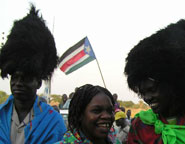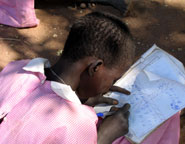
|

|

|
The Sudanese House of Representatives, elected in November 1953, chose Abdullah Khalil, leader of the Umma (People's) Party, as premier.However, Khalil's government lasted less than two years, before it was overthrown by army chief Ibrahim Abboud. Resenting the political domination of the mainly Muslim North, the mostly Christian and animist southerners launched an insurrection against the Khartoum government. This was the trigger for a conflict that has raged almost continuously ever since and has claimed an estimated 2 million lives in the southern part of the country. In a pattern to be repeated time and again, the new regime held talks with southern leaders and offered limited autonomy; the southerners then rejected the terms as inadequate. Abboud was, in turn, turfed out of office in 1964. In May 1969, the civilian government of Mohammed Ahmed Mahgoub, which had been elected after the fall of the Abboud regime in 1964, was itself deposed in a military coup that installed Jafaar al-Nimeri as president. Nimeri negotiated a settlement with the south in 1972. When the settlement collapsed in 1983, it signalled the beginning of the end for Nimeri himself. The main cause was the introduction of Islamic Sharia law, intended to placate increasingly troublesome Muslim elements complaining about the austerity program introduced on the instruction of the IMF earlier in the year. Not surprisingly, it was not well received in the south either and was later withdrawn. The southerners soon returned to fully-fledged armed struggle under the banner of the Sudanese People's Liberation Front (SPLF) and its military arm, the Sudanese People's Liberation Army (SPLA), led by John Garang. Kahrtoum politics were still as unstable as ever: in 1985, Nimeri was overthrown while visiting the USA. The new regime was unable to stabilize its rule and, after four years, was itself overthrown by General Omar al-Bashir. This coup was different. Unlike its predecessors, the new government had a political backbone and an ideological direction. These were provided by the National Islamic Front, a fundamentalist Islamic political organization led by Sheikh Hassan al-Turabi. The Front's influence quickly became apparent when Sharia was once again introduced at the beginning of 1991. At this time, it was publicly declared by the NIF regime that an ideal Sudanese woman should be a domestic servant taking care of the home, husband and children. The fundamentalist nature of the government in Khartoum was causing worries in many quarters and it was not long before SPLA attracted new supporters. These included Egypt, Ethiopia, Uganda and the United States. By 1995, the SPLA had recovered much of its position. In 1996, the Bashir-Turabi regime sought to consolidate its political legitimacy by holding national elections. These were comfortably won by al-Bashir, standing for the presidency, and al-Turabi as head of the National Congress Party. That same year, the Clinton administration of the U.S., apparently convinced that Sudan was supporting international terrorism and developing chemical weapons, launched a missile attack on a legitimate pharmaceutical plant. In 1999, the long-running southern war took a new turn when oil deposits, discovered earlier in the decade, came on stream and provided the government with a significant new source of revenue. With its coffers boosted, the government was now hopeful of a rapid victory over the rebels. It did not happen and, in late 2002, the government re-started talks with the rebels. Some progress was made: the government has now accepted autonomy for the south, while SPLA has conceded the application of Islamic Sharia law in government-controlled areas. In December 2003, the two sides also agreed to a carve-up of the revenues. However, problems accumulated and intensified in 2004. In January 2004, the army was forced to move to Darfur to quell the rebel uprisings, with ethnic Africans fighting repression by the Arab-dominated government (although with both sides following Islam). Over half a million people fled across the border into Chad. In March 2004, the UN announced that the pro-government Arab "Janjaweed" militias were carrying out systematic killings of African villagers in Darfur. This was later labeled as 'genocide' by the United States. Despite another signed deal to end the civil war in May 2004, between SPLA rebel leaders and the government, the conflict soon resumed. Finally, in January 2005, this North-South conflict officially came to an end with the signing of the Comprehensive Peace Agreement, establishing a power sharing relationship with the re-formed government of Sudan that incorporates a southern government (New Sudan) and the Khartoum based goverment into one government. In this way, it is difficult to give one accurate picture of the Sudanese government and the involvement of women in its political structure and societal standing. Generally, the situation of women in Sudan had deteriorated more sharply with the take over of the NIF regime and its imposition of the Islamic laws. Further, despite the country's considerable hydrocarbon resources and large agricultural sector, the country is considered one of the poorest in the world. This extreme poverty and displacement predominately affects Sudan's women and children. During the North-South conflict, and now in Darfur, women are subject to severe attacks ranging from the way they dress to their civil rights. Women were and are jailed, lashed, raped, and even enslaved. Rape is by far the most utilized tool of war in Darfur, as a systematic weapon of genocide. It is used to degrade and dehumanize. It produces abastarda babies, their unknown parentage is blasphemy in a culture whose religion is grounded in the sanctity of family. The very existence of these innocent children can shame a family for generations. For women in some more fundamentalist Islamic communities, it is a living death. This tactic has been part of the NIF government's ethnic cleansing strategies. In addition, the Khartoum-led government denies humanitarian assistance to the millions who have been displaced, many who have needlessly died of starvation. To date, women's representation in the Sudan's political system remains low. In the North-South Peace Agreement of 2005, it states that 30% of positions will be held by women; thus far, most of the seats remain empty due to lack of experienced professionals - male and female. This is directly linked to the fact that education, a major tool of empowerming a nation, is a limited resource for women, and often discouraged. We firmly agree with the Report of the Council on Foreign Relations which documented the enormous positive impact of educating girls on families, economies, and nations. With the Akon School for Girls, we are raising up a new generation of leaders for all of Sudan.
|


